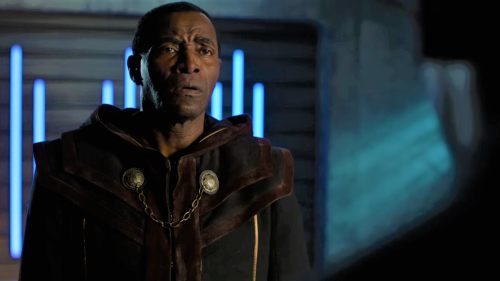CLOAK & DAGGER Review: “First Light” And “Suicide Sprints”
The first time Tandy (Olivia Holt) and Tyrone (Aubrey Joseph) meet – as children – it’s under dire circumstances. The color scheme is established instantly: Tandy is waiting to be picked up from ballet, dressed in a white leotard, and Tyrone is looking for his brother, dressed in a black hoodie. Tragedy strikes them both at the same time. Tandy’s father, distracted by a mysterious phone call and the destruction of a Roxxon oil rig, crashes his car into the lake. Meanwhile, Tyrone watches helplessly as a police officer shoots his unarmed brother, who falls into the same lake. Tyrone jumps in after his brother, but it’s too late to save him. He pulls Tandy out of the water instead.
It’s a beginning that sets the tone of the show: somewhere between Daredevil and Runaways, without the oppressive grittiness of the first or the bright, comic-book feel of the second. There’s something mythic to the images we see underwater – headlights and oil, light and darkness.
When we jump a decade into the future, the characters are in high school, but it’s hard to tell from the scam Tandy runs with her boyfriend, Liam (Carl Lundstedt). Tandy’s mom, while still alive, is a neglectful alcoholic; Tandy spends her nights sleeping in an abandoned church and doing stolen drugs (largely, I presume, for the show’s aesthetic).
Cloak & Dagger is slower to flesh out Tyrone’s character – it takes us until the second episode to really get a handle on who he is as a person – kind, driven, quiet, and angry underneath. His upper-middle-class home is radically different from Tandy’s: both parents are supportive, protective, and high-achieving, and he attends a Catholic school.
There’s a party in the woods, a girl in Tyrone’s class tells him; there’s a party in the woods, Tandy tells her boyfriend.
The present world takes a little too long to really crystallize. The character introductions are uneven, resulting in a series of “oh – oh wait – oh, I thought”s as I watched. But half an hour into the pilot, Tandy and Tyrone find each other again. The energy between the two actors immediately electrifies a show that had, until this moment, started to flag.
Tandy steals Tyrone’s wallet, and he chases her into an above-ground cemetery. When he reaches out and grabs her hand, something impossible happens. They’re thrown backward; Tandy’s hand begins to glow, and Tyrone’s pulses with shadow. Something sparks in Tandy’s memory: “Are you that kid?” she asks, awed. The vulnerability in their voices is tangible; both Holt and Joseph are capable actors, and they draw out the best in each other.
As the rest of the episode unfolds, Tandy and Tyrone’s powers begin to manifest. Tyrone keeps waking up in other parts of the city, traveling through the shadows. Each time, his power deposits him right near the dirty cop who killed his brother. At the end of the first episode, Tandy reaches into herself – literally – and stabs her would-be rapist with a dagger of light. I worried that Tyrone would be the one to save her here, but it was unwarranted; of course she’d draw her own defense.
I’m a sucker for this pairing: sharp girls and soft boys. In this world, light is the offensive weapon, and shadow is the defensive. The camera frames both characters this way, a brightness that wounds and a darkness that soothes. Tandy is beautiful, but she uses her beauty as a tool – a blunt instrument – and in many ways, so does the director. There are no lingering or objectifying shots of her. On the other hand, Tyrone is allowed a softness and elegance that I almost never see afforded men – especially black men. The first shot of him after he wakes up on a roof across town – wrapped in his jet-black bedsheets, which billow around him in the wind as he takes careful steps to survey his location – is nothing short of breathtaking.
The delineation of their powers could have been troubling, but so far the show has turned more than one stereotype on its head, especially with the powers themselves. Neither light nor darkness is coded as good or evil. The characters can neither fathom nor control their new abilities, so the audience gets to learn alongside them, which is thrilling.
Episode two takes its time digging into Tandy and Tyrone separately, solidifying Tandy’s character and fleshing out Tyrone’s more. We know they’re going to come back together again, so I wasn’t anxious or impatient during their separate, concurrent stories. In the wake of the stabbing, Tandy needs cash to get a new identity and leave town; when she realizes her deadbeat mother has found, and blown, her stash, she and Liam rob a wedding. Tyrone carries more emotional weight in this episode, trying to juggle school and basketball with continuing to follow his brother’s killer.
Like any good Marvel show, Cloak & Dagger features scenes tethered by an undercurrent of Catholicism, and Tyrone raises questions of justice and mercy with a priest at his school as he tries to explain how he feels. “All this anger inside of me – what if it came out and pointed to the person who poisoned me?” he says. “This poison running through my veins – doesn’t it belong in his, too?” When the priest asks him what God would think of this, he says “Who’s to say he’s not the one who gave me the idea in the first place?”
The scenes between Tyrone and his mother are powerful and heartbreaking; when Tyrone pushes against the weight of his mother’s expectations, feeling like he has to be perfect, she replies, “I’m afraid that even if you do everything perfectly I’m gonna lose you.”
There’s a visceral, beautifully shot scene in episode two, as well, when Tyrone’s mother reaches out for him and he sees – from what I can tell – into her subconscious. Tandy and Tyrone have both been getting these visions when they touch people; they’re not quite flashbacks, and they’re each rooted in a distinct setting, like a ballet studio (Tandy’s mom) or a forest (Tandy’s boyfriend).
It isn’t until the scene with Tyrone’s mother that I begin to understand what they’re seeing. She’s walking down the only supermarket aisle in an inky sea of darkness with her two young children. The cart’s wheel shrieks, and the fluorescent lights flicker, green and sickly. Tyrone’s brother runs off, and a shot rings out; Tyrone follows him, and we hear another one. Cloak & Dagger doesn’t shy away from the reality of modern America.
Besides all of these promising elements, there’s also a collection of loose ends that confuse the storytelling: an unrelated detective who keeps popping up and a mysterious subplot with Tyrone’s mother. But I’m excited for Cloak & Dagger because of the thing it’s going to become, the dance the characters are beginning to choreograph around each other – the anticipation and the narrative tension. Finding each other triggered their powers; they’re going to find their way back to one another again, and I can’t wait to watch how it happens.



